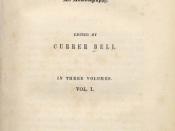Charlotte Bronte's novel, Jane Eyre, is a classic for one main reason; it has stood the test of time. R.W. Emerson stated this truth quite accurately, "Never read a book that is not a year old." From 1847 at its origin to 2003, where one senior's grade depends on it, Jane Eyre has many relevant and insightful points for all generations.
Jane Eyre is a love story that is treated rather unconventionally by the novelist. Jane was only a of eighteen and fell in love with her master, Edward Rochester, who was twice her age. She did not enjoy the advantages of either extraordinary beauty or social position. This fascinated Mr. Rochester; he was inspired by her courage, education, remarkable efficiency, high moral sense, and character. He too fell in love with her. But she was not just a romantic who was blind to the faults of her lover.
Jane was fully aware that Mr. Rochester was wealthy, status-conscious, and ruled by his pride. She was also conscious of his irritable nature, and yet she loved him. Her love, however, was subject to volatile changes. By surviving these changes, Jane's love for Rochester shows an example of true unconditional love, which is deep and enduring and does not change, though the world around her and her circumstance do change.
Charlotte Bronte handled the theme of love very delicately. Jane Eyre is an example of how love should be based on mutual respect, mutual need and mutual recognition of weaknesses. This is the formula for a successful marriage. Brontë did not idealize her heroine. On the contrary, she looked at Jane as an active person who was fearless, unashamed, passionate, and determined to have her rights acknowledged. Throughout Mr. Rochester's courtship, Jane retained her dignity and individuality. She would...



Jane Eyre
Thanks for a very good objective analysis of Charlotte Bronte's classic novel. You are correct in pointing out that Jane Eyre has stood the test of time. In fact, it is one of my favorite books. Most of all, I enjoyed the novel's message about the value of perseverance and hope. Your essay was highly readable and engaging. Liked it!
5 out of 5 people found this comment useful.